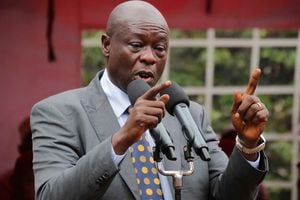Let’s give politicians a break

From left: Deputy President William Ruto, ODM leader Raila Odinga, President Uhuru Kenyatta and Former Vice-President Kalonzo Musyoka at a past event
Anyone with doubts as to why Kenyan voters elect the wrong people and then live to regret it should join a WhatsApp group into which I was recently recruited.
I rarely participate in the political banter that is often too tedious for words, but occasionally, some genuine pieces of information do creep in and one can learn what other people are thinking.
As a result, I am sometimes pleasantly surprised that some of my friends really do care for the welfare of their mates, but even more frequently astonished by the banality that too often goes for sagacity.
Can someone, for instance, explain why we have chosen to blackmail those who wish to run for political office by constantly informing them that unless they promise to repair roads, connect villagers with running water, build classrooms and ensure that electricity blackouts are no more, they won’t get any votes?
Can anyone tell me how a person who wishes to run as a member of a county assembly with modest resources is supposed to perform these miracles when the job he or she is looking for is merely about representation?
Two things are bound to happen when we, voters, keep expecting those who would lead us to take over every project, own it and fund it. I shouldn’t be saying this because defending politicians is not exactly my favourite pastime, but we really must think deeply about the kind of pressure we pile on men and women who would, within reason, be willing to help.
If everyone who has problems paying school fees expects a candidate for office to do it, if everyone with a medical problem wants his future MP to foot the bill, how do we expect that to happen?
Pedestrian thinking
We have lost our values and sense of responsibility and resorted to pedestrian thinking. Politicians cannot have the answer to all our problems. We cannot say that since they want to be elected, they must be ready to pay for the privilege.
Unfortunately, what happens is that we ignore merit and allow the moneybags among us to buy political offices, and then we expect the highest bidders to work for our welfare.
Why should they? We must change the way we assess leadership qualities, otherwise we shall forever put our trust in people with mediocre propensities.
There is a crisis of expectations that drives away good leaders by expecting them to bribe us for our votes instead of convincing us with clear manifestos and statements of intent that if we vote them in, they will indeed work for us.
Enjoy their loot
Once they bribe us, they will have no qualms about dishing to us lies in generous dollops, for they know that once they are addressed as mheshimiwa, they can enjoy their loot without having to account for the promises they made while seeking votes.
Talking of loot, one of the reasons we get leaders who are only interested in their own stomachs is that we demand so much of them that they have no choice but to steal from the public purse to replenish what they used while seeking votes.
This is one of the reasons they spend so much time chasing tenders or seeking ways to steal constituency development or bursary funds without getting caught.
An expression that has influenced my interaction with the world around me is that there is nothing like free lunch; there is always a huge price to pay.
Free goodies
We Kenyans are daily being bombarded by politicians with offers of free goodies. Right now, at the national level, we are being told that the only way to uplift the lot of the poor is to assist them start their hustles by providing them with seed money.
Unfortunately, nobody is saying where that money will come from, and since millions of shillings are being dished out weekly at public rallies or church functions, we tend to believe such nonsense, and do not even pause to wonder whether such generosity is sustainable. Leaders shouldn’t be expected to become mobile ATMs.
As a result, Kenyans are now in a situation where they have suspended belief in themselves and their ability to pull themselves up from the clutches of poverty.
By the time they come to understand that there is nothing like free lunch, it is often too late and unfortunately, they will not have “eaten” enough to sustain themselves for five long years. Man cannot live on handouts and promises alone.
Recently, I fell into a conversation with a fellow who fervently believes in the bottom-up development model.
For some reason, this chap cannot hold a job for any length of time and he is soon back in the village claiming that his bosses expect him to work six days a week instead of five.
When I asked him whether, if he was helped to start a business, he would still insist on a five-day week, he fumbled for an answer, and I could tell that he had never wanted to work hard in the first place and all he wants is free money to buy himself alcohol.
I wished him luck.
Mr Ngwiri is a consultant editor; [email protected]





